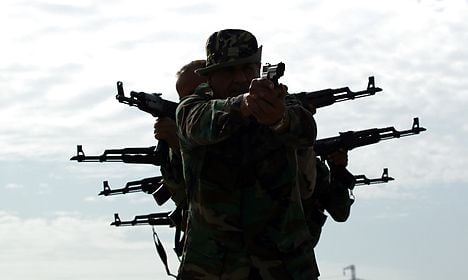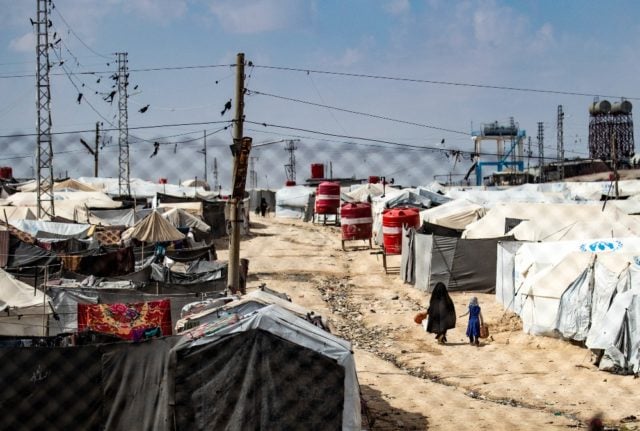JIHADIST
Danish jihadist approach under US media scrutiny
Within a span of three days, both Newsweek and Washington Post have run in-depth stories on Aarhus's strategy to deal with Danes who return from fighting abroad.
Published: 21 October 2014 13:29 CEST

Some see Aarhus's approach to returning fighters as a model for Europe while others call it dangerously naïve. Photo: Haidar Hamdani/Scanpix
The controversial approach that Denmark’s second-largest city Aarhus has taken to returning jihadists has caught the attention of the American media.
Aarhus has decided that Danish citizens who return from fighting abroad should be welcomed back and rehabilitated rather than punished.
Within the past week, both Newsweek and the Washington Post have run in-depth articles on the Aarhus strategy. Both features express some scepticism toward the approach.
“It seems there’s something jihadist in the state of Denmark,” Newsweek writes.
“Aarhus is treating its returning religious fighters like wayward youths rather than terrorism suspects,” the Washington Post says.
“The Danes are treating their returned jihadists as rebellious teenagers rather than hostile soldiers beyond redemption,” Newsweek counters.
Both stories point to Denmark’s outsized contribution of foreign fighters. Intelligence officials estimate that well over 100 Danes, largely young Muslim men, have fought in Syria and Iraq. That gives Denmark the second highest proportion behind only Belgium.
In September, the Danish government announced a plan for combating radicalisation through a combination of punitive measures and preventive strategies. But despite the Danish Security and Intelligence Service (Politiets Efterretningstjeneste – PET) warning that Danes returning from conflict abroad can “increase the terror threat against Denmark”, the country has not arrested a single returning fighter.
Instead, returning jihadists are offered counselling and even job placement assistance. The rehabilitation programme is most widespread in Aarhus, but is also in place in other cities including Copenhagen.
“While other countries are sending their jihadists to court – last month 46 suspected jihadists went on trial in Belgium – the Danes are tackling the problem in an innovative fashion. They’re sending them to the shrink,” Newsweek writes about the approach.
The Washington Post focused on a Danish citizen who used the pseudonym ‘Talha’ as an example of Aarhus’s strategy.
“In other countries, Talha — one of hundreds of young jihadists from the West who has fought in Syria and Iraq — might be barred from return or thrown in jail. But in Denmark, a country that has spawned more foreign fighters per capita than almost anywhere else, the port city of Aarhus is taking a novel approach by rolling out a welcome mat,” the newspaper wrote.
Both articles also focus on the controversial Aarhus mosque Grimhøjmoskeen, with the Post calling it “one of the most polarising houses of worship in Europe”. In September, the mosque famously declared its open support for the terrorist organisation Isis before a mosque spokesman walked back his comments in light of the attention they received.
See also: Danish mosque declares support for Isis
The mosque is also the home of Abu Bilal Ismail, who in July was caught on video calling on God to “destroy the Zionist Jews”. Both Newsweek and the Washington Post also report that Abu Hamza, who became the first Danish citizen ever to be added to the US terror list, is connected to the mosque.
Grimhøjmoskeen has long been accused of promoting an extremist interpretation of Islam and East Jutland Police estimate that at least 22 of the young men who have fought abroad come from Grimhøjmoskeen.
Highlighting the controversial nature of Aarhus’s lenient approach to returning jihadists, Newsweek and the Washington Post speak to both proponents and detractors.
“Denmark is at the forefront of how to prevent the jihadist problem. PET is incredibly active, including outside Denmark, and is also the driving force behind the reintegration efforts,” Magnus Ranstorp, a terrorism expert at the Swedish National Defence College who has spoken with The Local on numerous occasions about what drives Danes to join jihad, told Newsweek.
“They are being much too soft [in Aarhus], and they fail to see the problem. The problem is Islam. Islam itself is radical. You cannot integrate a great number of Muslims into a Christian country,” Danish People’s Party MP Marie Krarup told the Washington Post.
Both features can be read here:
Denmark tries a soft-hand approach to returned Islamist fighters (Washington Post)
Url copied to clipboard!


 Please whitelist us to continue reading.
Please whitelist us to continue reading.
Member comments